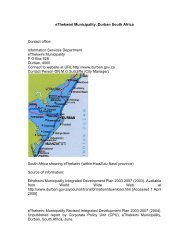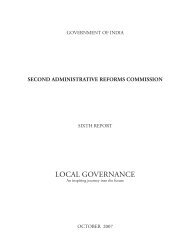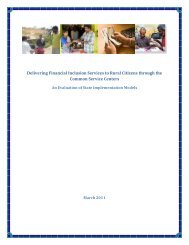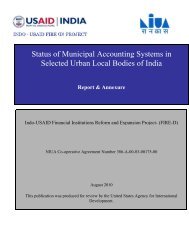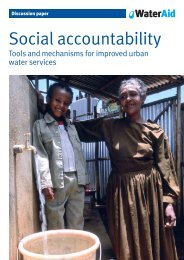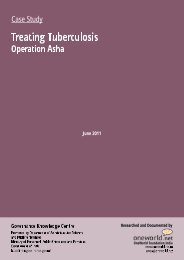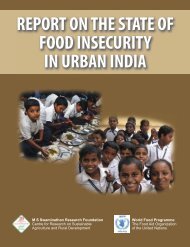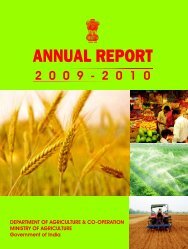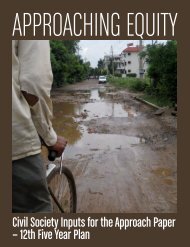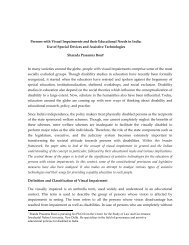Changing Framework of Local Governance and - Create
Changing Framework of Local Governance and - Create
Changing Framework of Local Governance and - Create
You also want an ePaper? Increase the reach of your titles
YUMPU automatically turns print PDFs into web optimized ePapers that Google loves.
<strong>Changing</strong> <strong>Framework</strong> <strong>of</strong> <strong>Local</strong> <strong>Governance</strong> <strong>and</strong> Community Participation in Elementary EducationIn fact, following the constitutional directive many states enacted panchayati raj acts in 1950s,though not all followed the same pattern. The situation became quite uneven on the ground asnot many state governments empowered the bodies effectively. Yet all state governments havecontinued to vouch for the policy <strong>of</strong> decentralization <strong>and</strong> a variety <strong>of</strong> political power sharingframeworks have emerged across the country, all under the common banner <strong>of</strong>decentralization <strong>and</strong> with the objective <strong>of</strong> enhancing community participation in governance.In general, decentralization seems to mean different things to different people, depending onthe political <strong>and</strong> administrative context in which the term is being used. Even though usedextensively by policy-makers as well as academics, the public discussion on decentralizationis <strong>of</strong>ten confusing, assuming the character <strong>of</strong> sweeping, cross-disciplinary claims about theeffects <strong>of</strong> administrative measures on the quality <strong>and</strong> efficiency <strong>of</strong> both government <strong>and</strong> socialinteraction (Fauget, 1997). It is within this ambiguously defined framework <strong>of</strong> decentralizationthat one has to find meaning to governance 2 reforms initiated in the education sector in Indiafor transfer <strong>of</strong> powers <strong>and</strong> authorities to local level actors.With changing priorities across different Indian states, the contours <strong>of</strong> decentralization ineducation have also undergone a variety <strong>of</strong> transformations in different parts <strong>of</strong> the country.This paper presents an analytical overview <strong>of</strong> the changing framework <strong>of</strong> governance <strong>of</strong>elementary education <strong>and</strong> community participation in India with a special focus on improvingthe participation <strong>of</strong> children in schools.Based on a review <strong>of</strong> academic <strong>and</strong> government literature, this paper discusses changes <strong>and</strong>innovations to education governance in India. It examines initiatives that aim to strengthenlocal governance <strong>of</strong> education <strong>and</strong> the effects these have had on service delivery. Improvedgovernance <strong>of</strong> education has been identified as one way in which levels <strong>of</strong> access, quality <strong>and</strong>participation in education can be improved (UNESCO, 2009). Improving governance <strong>of</strong>education has an important role to play in ensuring meaningful access to education for allchildren in India.2 Even governance does not carry a uniform underst<strong>and</strong>ing across academics as well as developmentpractitioners. The phrase is taken to include different activities ranging from policy formulation, planning,programme implementation, co ordination, personnel supervision, monitoring <strong>and</strong> evaluation <strong>and</strong> so on. Whileweak management is frequently cited as a major impediment to improving education quality <strong>and</strong> delivery, fewstudies actually report on the personnel characteristics, career development, or pr<strong>of</strong>essional problems <strong>of</strong>administrators at any level (Chapman, 2002)2




